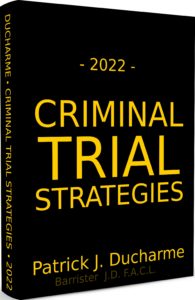A Judge rarely performs his functions adequately unless the case before him is adequately presented.
The Considerations of selecting a Judge Alone Trial In Superior Court
The most significant difference between jury trials and Judge alone trials is that judges generally do not remain passive. They ask questions. They comment. Jurors, in contrast, are there to watch and listen. Some judges may permit jurors to raise their hand and occasionally ask questions, but this practice is rare in Canada. Most often jurors do not speak or interrupt the proceedings.
Additionally, jurors are not expected to know anything about the case except that which unfolds during the calling of the evidence. Judges often have pretrial conferences, or, notes from other justices who have conducted pretrial conferences on the nature of the evidence and the likely legal issues that will arise. The jurors are not expected to know principles of law. They are told they are only to concern themselves with findings of fact. They do not intrude upon the trial.
Despite these differences between Judge (alone) trials and jury trials, the elements of good advocacy remain the same. Counsel are expected to conduct the trial with fairness, sincerity and honesty. In both types of trial counsel is expected to abide by the rules of professional conduct and to abstain from any method or tactic that would seek to deceive the trier of fact.
Rarely will a Judge trying a case without the assistance of a jury sit quietly throughout the trial. Most judges involve themselves in the process by asking questions and clarifying answers given by witnesses. The Judge’s interaction with counsel and witnesses is often the best guide to discerning what concerns the Judge may hold, permitting informed and perceptive counsel to shape final argument in a fashion that answers the Judge’s questions or concerns.
Judges rely upon counsel for assistance. Questions from the bench should therefore never be treated by counsel with disdain. Instead, the Judge’s questions or stated issues are bright beacons illustrating the questions counsel must answer in order to be successful. Good advocates never miss an opportunity to be persuasive with the court. Proper preparation allows counsel to anticipate contentious areas and to have case law readily available for legal arguments that can be anticipated.
Most judges are particularly impressed when counsel demonstrate their awareness of the contentious issues. Good counsel generally make concessions in areas that are not contentious. They do not raise issues unless they require an answer by the court.
Opposing counsel may agree on a statement of facts in areas that are not contested. These agreements should be reduced to writing, This is referred to as an Agreed Statement of Facts or ASF. We suggest a word of caution is needed here. An ASF must be very precise. Loosely worded or improperly prepared ASF’s may create more problems than they seek to solve. As a matter of law, if the sworn testimony at trial is inconsistent with the wording of the ASF, the sworn testimony will be relied upon by the trier of fact.
An ASF that has been poorly worded may produce a lack of confidence in counsel’s ability to understand or state the facts of the case accurately. The same is true for admissions of fact by the Defence pursuant to section 655 of the Criminal Code. Once admitted, the prosecution is no longer required to produce proof of those facts. Counsel may not be able to adjust or reverse an admitted fact even if counsel did not accurately anticipate the prosecution’s inability to prove a fact necessary for conviction.
Consequently, while ASF’s and admitted facts by the Defence are often appreciated by the presiding Judge, they should not be entered into lightly or without sufficient preparation or thought.
The areas of evidence that are admitted or agreed upon in advance as not contentious, and therefore not requiring proof, must be very carefully considered and be supported with specific written instructions from counsel’s client. A mistake here might lead to an allegation of negligence or incompetence on the part of counsel.
The above is the an excerpt of Patrick J Ducharme’s book, Criminal Trial Strategies, available at Amazon or in bulk through MedicaLegal Publishing.
Read or listen to the Preface and Introduction and subscribe to Patrick Ducharme’s Youtube Channel.

